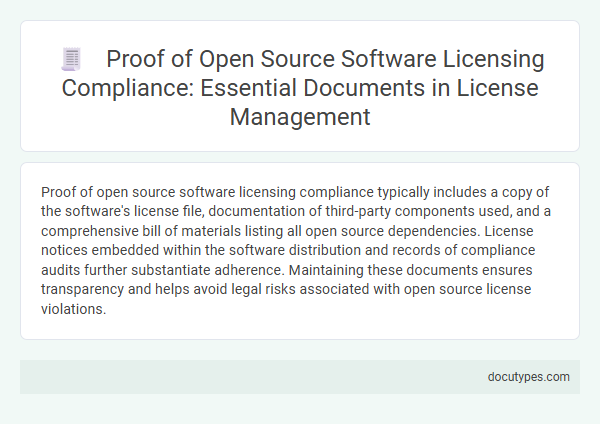Proof of open source software licensing compliance typically includes a copy of the software's license file, documentation of third-party components used, and a comprehensive bill of materials listing all open source dependencies. License notices embedded within the software distribution and records of compliance audits further substantiate adherence. Maintaining these documents ensures transparency and helps avoid legal risks associated with open source license violations.
Introduction to Open Source Software Licensing Compliance
Open source software licensing compliance ensures that the rights and obligations associated with using open source software are properly followed. Common documents serving as proof include license texts, compliance reports, and distribution manifests that detail software components and their respective licenses. Understanding these documents helps you verify lawful software usage and maintain trust in development processes.
Importance of Maintaining Licensing Documentation
Proof of open source software licensing compliance includes license files, such as LICENSE or COPYING documents, that explicitly state the terms and conditions of use. Accompanying documentation may also include contributor agreements and compliance reports that verify adherence to open source licenses.
Maintaining thorough licensing documentation is crucial for mitigating legal risks and ensuring proper use of open source components within software projects. Clear records facilitate audits, foster transparency, and support compliance with licensing obligations, which protects both developers and organizations from potential infringement claims.
Key Documents Required for Compliance
Proof of open source software licensing compliance requires specific documentation that verifies proper usage and distribution according to license terms. Key documents include license files, copyright notices, and compliance reports.
You must maintain the original license texts accompanied by any modifications noted clearly. Source code archives with embedded license information act as tangible evidence. Comprehensive compliance reports outline adherence to all obligations defined by the open source licenses.
Software Inventory and Dependency Tracking
Software inventory lists all open source components used within a project, serving as a critical document for licensing compliance. Dependency tracking tools automatically monitor and record all external libraries and their licenses to ensure adherence to open source requirements. Maintaining accurate software inventory and dependency records helps demonstrate transparent license compliance in audits and legal reviews.
License Agreements and Terms Repository
Proof of open source software licensing compliance is essential for ensuring proper use and distribution of software. License agreements and terms repositories provide clear documentation of the rights and obligations under open source licenses.
- License Agreements - These documents outline the specific permissions, restrictions, and obligations associated with the use of open source software.
- Terms Repositories - Centralized databases that store standardized license texts and compliance guidelines for various open source licenses.
- Compliance Records - Documentation such as acknowledgments or reports that demonstrate adherence to the terms specified in license agreements and repositories.
Bill of Materials (BoM) for Open Source Components
Proof of open source software licensing compliance often includes a Bill of Materials (BoM) for open source components. The BoM lists all open source libraries and their associated licenses used within a software project.
A comprehensive BoM helps organizations demonstrate adherence to licensing requirements by providing transparency about incorporated open source components. This document is essential for managing legal risks and ensuring compliance with open source license obligations.
Contributor and Copyright Assignment Agreements
Proof of open source software licensing compliance often includes contributor agreements and copyright assignment agreements to ensure proper legal rights and responsibilities. These documents help verify that contributions are made under authorized licenses.
- Contributor Agreements - Legal contracts that outline the terms under which contributors submit code, confirming their rights to license the material.
- Copyright Assignment Agreements - Documents transferring copyright ownership from contributors to a designated entity, securing centralized license management.
- Compliance Verification - These agreements provide clear evidence that Your project adheres to open source licensing requirements and protects intellectual property.
Maintaining these documents is essential for demonstrating your commitment to open source licensing compliance and mitigating legal risks.
Compliance Audit Reports and Checklists
What documents serve as proof of open source software licensing compliance? Compliance audit reports provide detailed assessments of how software components adhere to licensing requirements. Checklists offer a systematic way to verify that all licensing obligations are met during software development and distribution.
Recordkeeping for License Notices and Attribution
Maintaining proper documentation is essential for proving compliance with open source software licenses. Keeping detailed records of license notices and attribution ensures transparency and legal adherence.
- License Notice Files - These files contain the original license text and must be preserved to demonstrate compliance with open source terms.
- Attribution Documentation - Records showing proper credit given to original authors help fulfill attribution requirements mandated by many open source licenses.
- Change Logs and Source Code Repositories - Version histories and code repositories provide evidence of license adherence and trace modifications made under open source agreements.
What Documents Serve as Proof of Open Source Software Licensing Compliance? Infographic

